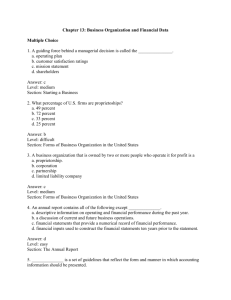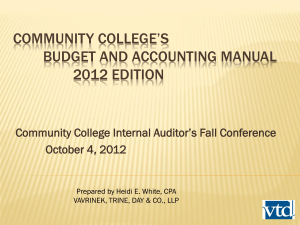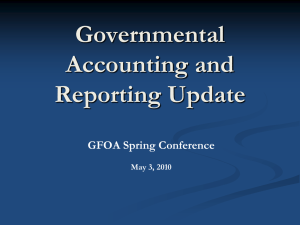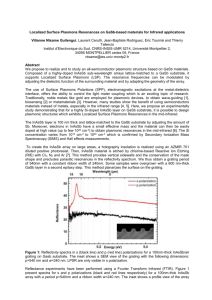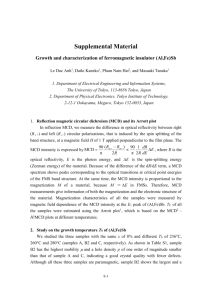Recording of Revenues and Expenses as Operating Nonoperating
advertisement
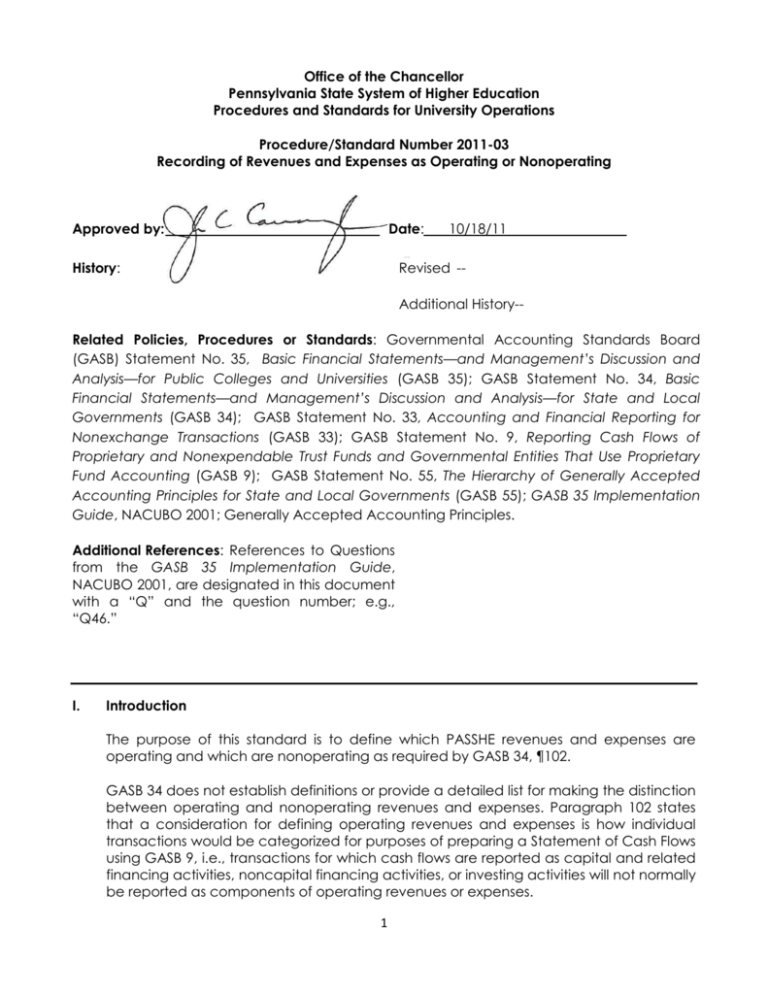
Office of the Chancellor Pennsylvania State System of Higher Education Procedures and Standards for University Operations Procedure/Standard Number 2011-03 Recording of Revenues and Expenses as Operating or Nonoperating Approved by: Date: History: 10/18/11 Revised -Additional History-- Related Policies, Procedures or Standards: Governmental Accounting Standards Board (GASB) Statement No. 35, Basic Financial Statements—and Management’s Discussion and Analysis—for Public Colleges and Universities (GASB 35); GASB Statement No. 34, Basic Financial Statements—and Management’s Discussion and Analysis—for State and Local Governments (GASB 34); GASB Statement No. 33, Accounting and Financial Reporting for Nonexchange Transactions (GASB 33); GASB Statement No. 9, Reporting Cash Flows of Proprietary and Nonexpendable Trust Funds and Governmental Entities That Use Proprietary Fund Accounting (GASB 9); GASB Statement No. 55, The Hierarchy of Generally Accepted Accounting Principles for State and Local Governments (GASB 55); GASB 35 Implementation Guide, NACUBO 2001; Generally Accepted Accounting Principles. Additional References: References to Questions from the GASB 35 Implementation Guide, NACUBO 2001, are designated in this document with a “Q” and the question number; e.g., “Q46.” I. Introduction The purpose of this standard is to define which PASSHE revenues and expenses are operating and which are nonoperating as required by GASB 34, ¶102. GASB 34 does not establish definitions or provide a detailed list for making the distinction between operating and nonoperating revenues and expenses. Paragraph 102 states that a consideration for defining operating revenues and expenses is how individual transactions would be categorized for purposes of preparing a Statement of Cash Flows using GASB 9, i.e., transactions for which cash flows are reported as capital and related financing activities, noncapital financing activities, or investing activities will not normally be reported as components of operating revenues or expenses. 1 As a general rule, PASSHE classifies those income and expense transactions that are related to its principal purpose and program activity as operating; all other income, gains, expenses, and losses are nonoperating. II. Definitions A. Capital and Related Financing Activities: Activities related to (a) acquiring and disposing of capital assets used in providing services or producing goods; (b) borrowing money for acquiring, constructing, or improving capital assets and repaying the amounts borrowed, including interest; and (c) paying for capital assets obtained from vendors or credit (GASB 9, ¶23). B. Capital Appropriations: Appropriations earmarked for capital projects. C. Exchange Transaction: A transaction in which each party receives and gives up essentially equal values (GASB 33 Summary). D. Generally Accepted Accounting Principles (GAAP): The widely accepted set of rules, conventions, standards, and procedures for reporting financial information. The Governmental Accounting Standards Board (GASB) predominantly establishes GAAP for governmental organizations such as PASSHE. E. Investing Activities: Activities related to making and collecting loans (except program loans, such as student loans) and acquiring and disposing of debt or equity instruments (GASB 9, ¶26). F. Level D GAAP Hierarchy: The GAAP hierarchy governs what constitutes GAAP for all state and local governmental entities; Level D is the lowest level of authoritative literature that establishes GAAP, consisting of implementation guides published by the GASB staff and practices that are widely recognized and prevalent in state and local governments (GASB 55). G. National Association of College and University Business Officers (NACUBO): A nonprofit professional organization representing chief administrative and financial officers at colleges and universities across the country. NACUBO’s Financial Accounting and Reporting Manual (FARM) and implementation guides are industry guidance and Level D in the GAAP hierarchy, i.e., lowest level authoritative literature. H. Noncapital Financing Activities: Activities related to borrowing money for purposes other than to acquire, construct, or improve capital assets and repaying those amounts borrowed, including interest (GASB 9, ¶20). I. Nonexchange Transaction: A transaction in which the university gives (or receives) value without directly receiving (or giving) equal value in return (GASB 33 Summary). J. Operating Activities: Activities resulting from providing services and producing and delivering goods, including income from noncapital grants and all transactions and 2 other events that are not defined as capital and related financing, noncapital financing, or investing activities (GASB 9, ¶16–17). III. Procedure A. Classification of Revenues and Expenses as Operating or Nonoperating 1. Operating Revenue PASSHE will record the following as Operating Revenue: a) Tuition b) Academic and instructional fees c) All other student fees d) Student financial aid e) All auxiliary activity f) Corporate sponsorships; g) Revenue from cogeneration sales h) Perkins Loans, including interest payments (Q38) i) Pell, SEOG, and PHEAA grants Note: The Integrated Postsecondary Education Data System (IPEDS) Finance Survey requires that Pell grants be reported as federal nonoperating grants. (PASSHE continues to record Pell grants as operating, despite recent guidance issued by GASB to record Pell grants as nonoperating, since recording Pell grants as nonoperating creates a mismatch with the related tuition discount, which is reported as operating. GASB’s guidance, which was issued in its Comprehensive Implementation Guide and is Level D in the GAAP hierarchy, is considered controversial and is still under discussion). j) Governmental and private grants and contracts in which the grantor receives equal value for the funds given to the university, e.g., a research grant in which the primary purpose of the grant is to provide the grantors with the results of the research. 1) As a general rule, all grants, except for capital grants, are operating revenue (Q38). 2) If the contract or grant provides for purchase of equipment or other capital items, and the equipment is incidental to the program activity, the revenue still will be classified as operating revenue (Q46). 3) Indirect cost recoveries associated with operating grants are operating revenues (Q41). 2. Nonoperating Revenue PASSHE will record the following as Nonoperating Revenue: a) Appropriations (as required by GASB 35, ¶50-52) 1) Capital appropriations are displayed on the Statement of Revenues, Expenses, and Changes in Net Assets (SRECNA) after Income before other revenues, expenses, gains, and losses (Q44). 2) General appropriations that are used for capital purposes are reported on the SRECNA as State appropriations, general and restricted (Q45). 3 b) Gifts 1) Gifts specified as additions to permanent or term endowments are reported on the SRECNA in the capital contributions category below Nonoperating Revenues (Expenses). 2) Gifts not specified as additions to endowments are reported on the SRECNA as Gifts for other than capital purposes. c) Parking and library fines d) Investment income, including interest income (except interest on Perkins Loans)and unrealized gains and losses (Q36) e) Capital grants 1) If the primary purpose of the contract or grant is equipment acquisition, it is a capital grant or contract, and the transaction is reported on the SRECNA as a Capital grant after Income before other revenues, expenses, gains, and losses (Q46). 2) Indirect cost recoveries associated with capital grants are nonoperating revenues (Q41). f) Gains on the sale of investments g) Gains on the disposal of assets h) Governmental and private research grants and contracts in which the grantor does not receive equal value for the funds given to the university i) Any other revenue or gain transactions that are reported on the Statement of Cash Flows as capital and related financing activities, noncapital financing activities, or investing activities 3. Expenses and Losses PASSHE will record all expenses as Operating Expenses, with the exception of the following, which will be recorded as Nonoperating Expenses or Losses: a) Interest expense b) Loss on the sale of investments c) Loss on the disposal of assets d) Extraordinary expenses, e.g., adjustments for changes in accounting policies, casualty losses, and settlement payments made as a result of lawsuits e) Any other expense or loss transactions that are reported on the Statement of Cash Flows as capital and related financing activities, noncapital financing activities, or investing activities. 4. Financial Statement Disclosure PASSHE, both at the individual university level and at the consolidated level, will disclose this standard in the annual financial statements’ summary of significant accounting policies and use it consistently from period to period. IV. Implementation This standard is effective April 1, 2001. 4
